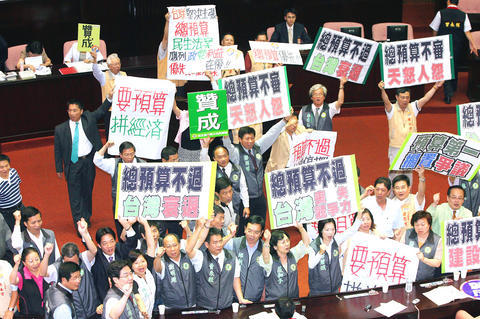The legislature yesterday approved a motion to extend the current session despite opposition from pan-green lawmakers.
The session was originally scheduled to end next Thursday.
Pan-blue lawmakers yesterday proposed a motion calling for extending the session to June 15.

PHOTO: WANG YI-SUNG, TAIPEI TIMES
Democratic Progressive Party (DPP) and Taiwan Solidarity Union (TSU) lawmakers boycotted the motion, saying they would only support the extension if the government budget bill would be the first item to be reviewed.
But given the pan-blue majority, the motion to extend the session passed.
Meanwhile, the DPP and the TSU's request to move the budget bill up on the agenda was voted down by the pan-blues.
The budget remains stalled as Chinese Nationalist Party (KMT) lawmakers have been using it as a bargaining chip for the DPP to support a review of the KMT-backed Central Election Commission (CEC) bill.
The KMT proposal recommends that CEC members be selected by political parties in proportion to the number of their legislative seats, replacing the current system, under which they are designated by the premier and appointed by the president.
KMT lawmakers have refused to review the budget bill ahead of the CEC bill unless the DPP gives in to its demands.
Later yesterday, Legislative Speaker Wang Jin-pyng (王金平) again convened a meeting attended by the KMT and DPP caucus whips at his residence, but they still failed to reach consensus on the CEC bill and two other DPP-proposed amendments that would allow the holding of a referendum and national election on the same day.
Premier Chang Chun-hsiung (
"If the bill remains stalled for one more month, in June, local governments would experience financial difficulties in repairing classrooms and bridges and providing aid and grants to poor students," Chang told reporters, while urging the legislature to speed up the budget review.

ALIGNED THINKING: Taiwan and Japan have a mutual interest in trade, culture and engineering, and can work together for stability, Cho Jung-tai said Taiwan and Japan are two like-minded countries willing to work together to form a “safety barrier” in the Indo-Pacific region, Premier Cho Jung-tai (卓榮泰) yesterday said at the opening ceremony of the 35th Taiwan-Japan Modern Engineering and Technology Symposium in Taipei. Taiwan and Japan are close geographically and closer emotionally, he added. Citing the overflowing of a barrier lake in the Mataian River (馬太鞍溪) in September, Cho said the submersible water level sensors given by Japan during the disaster helped Taiwan monitor the lake’s water levels more accurately. Japan also provided a lot of vaccines early in the outbreak of the COVID-19 pandemic,

Kaohsiung Mayor Chen Chi-mai (陳其邁) on Monday announced light shows and themed traffic lights to welcome fans of South Korean pop group Twice to the port city. The group is to play Kaohsiung on Saturday as part of its “This Is For” world tour. It would be the group’s first performance in Taiwan since its debut 10 years ago. The all-female group consists of five South Koreans, three Japanese and Tainan’s Chou Tzu-yu (周子瑜), the first Taiwan-born and raised member of a South Korean girl group. To promote the group’s arrival, the city has been holding a series of events, including a pop-up

TEMPORAL/SPIRITUAL: Beijing’s claim that the next Buddhist leader must come from China is a heavy-handed political maneuver that will fall flat-faced, experts said China’s requirement that the Dalai Lama’s reincarnation to be born in China and approved by Beijing has drawn criticism, with experts at a forum in Taipei yesterday saying that if Beijing were to put forth its own Dalai Lama, the person would not be recognized by the Tibetan Buddhist community. The experts made a remarks at the two-day forum hosted by the Tibet Religious Foundation of His Holiness the Dalai Lama titled: “The Snow Land Forum: Finding Common Ground on Tibet.” China says it has the right to determine the Dalai Lama’s reincarnation, as it claims sovereignty over Tibet since ancient times,

Temperatures in some parts of Taiwan are expected to fall sharply to lows of 15°C later this week as seasonal northeasterly winds strengthen, the Central Weather Administration (CWA) said today. It is to be the strongest cold wave to affect northern Taiwan this autumn, while Chiayi County in the southwest and some parts of central Taiwan are likely to also see lower temperatures due to radiational cooling, which occurs under conditions of clear skies, light winds and dry weather, the CWA said. Across Taiwan, temperatures are to fall gradually this week, dropping to 15°C to 16°C in the early hours of Wednesday